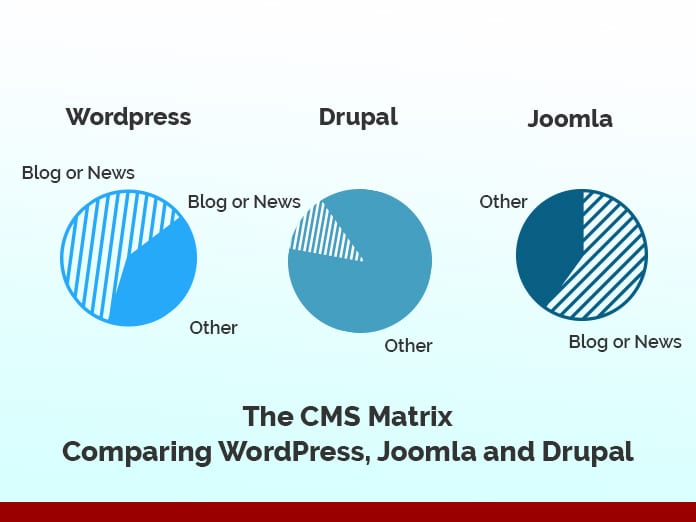So now that you have thought of making a sound presence of your brand digitally, are you still afraid of coding, back-end maths and technical aspects of it? Fret not. This is because you are like the millions of newbies out there who are scratching their head real hard trying to choose the right Content Management System (CMS) for themselves. With WordPress, Joomla and Drupal as the three most prominent leader, choosing one system that will give you the basic functionality, along with the wide array of add-on features can be a tad bit intimidating.
With no one-size-fits-all solution; choosing the right content management system depends upon many factors, such as technical competency, immediate and future branding goals, budget and overall look, and feel. To break the ice, on one hand, WordPress is a simple CMS, which is apt for non-technical work force who would want a friendly and flexible platform, which is easy to operate. On the other hand, Drupal is meant for hard core technical developers who want to maintain a highly customised website for scalability and complex content organisation. And in between Drupal and WordPress comes Joomla for people who would want to maintain a fine balance between the difficult and easiness of content management system.
Still worried about which Content Management System to opt for? Read on our step-wise dissemination of Drupal, Joomla, and WordPress and find ‘the’ one suitable to your goals and interest yourself:
Jump to Section
About CMS Platforms
Drupal (www.drupal.org): Drupal is a robust and technician (read developer) friendly CMS, which helps in building complex and difficult websites. Just like any other powerful tool, in order to operate Drupal one needs prior expertise and hands-on experience.
Joomla (www.joomla.org): Joomla is a CMS that offers the mid-way road between the developer-dedicated and intricate capabilities of Drupal and end user-friendly however quite strong website development options that what WordPress offers.
WordPress (www.wordpress.org): A journey that began to create an everyday-use blogging platform, can today be used by newbies and veterans alike, WordPress is among the most loved CMS platform. Armed with a wide repertoire of themes, plugins, and widgets, WordPress can be literally learned to be operated in few minutes and its beauty lies in its simplicity.
Example CMS Sites
Drupal: Community Portal: Fast Company, Team Sugar
Joomla: Social Networking: MTV Networks Quizilla, Education: Harvard University and Restaurant: IHOP
WordPress: Social Networking: PlayStation Blog, News Publishing: CNN Political Ticker, Education/Research: NASA Ames Research Center and News Publishing: The New York Observer
Ease of Use
Drupal: One of the highly technical CMS among the three, Drupal is tough to use. However, no one can deny the fact that it also is capable of producing the most advanced websites of all the three. But hey, the news is good, as with each latest release of Drupal, it is becoming much easier to use. You should opt for this CMS, only if you are up with the idea of learning this software or can hire someone to operate it for you.
Joomla: Pretty easy to handle when compared to Drupal, but quite complex to handle when compared to WordPress. With hardly any effort investment when it comes to understanding the structure and terminology of Joomla, one can create technically sound websites using this humble CMS.
WordPress: A CMS where absolutely next to nil technical expertise is required; WorPress is quite easy and intuitive CMS, which can perhaps set up your website within minute. WordPress is unarguably the most used CSM worldwide.
Features of CMS Platforms
Drupal: Drupal is basically famous for its ability to devise powerful taxonomy and its features to tag, categorise and organise convoluted and complex content.
Joomla: Tailor made especially to be a community platform, Joomla has a steady pulse when it comes to tapping the strong social networking feature.
WordPress: Irrespective of the fact you are an expert or novice, WordPress is one CMS that is sure to suit the sensibilities and preferences of developers and designers alike. Loaded with minimalistic instructions, clients can easily take over the website management when they have WordPress to deal with. A system that can boast of its extensive selection of themes, it is fairly simple and has easy-to-adhere-to tutorials and instructions manual.
Caching Plugins
Drupal: Best used for complex, advanced and versatile sites. Especially suited for people who want to run community platform websites with multiple users and for online websites and huge digital stores.
Joomla: If you are looking for a system that has more content and structure flexibility when compared to what WordPress offers, then don’t think twice before going ahead with Joomla. It helps in building sound E-commerce platforms, social networking websites and much more.
WordPress: Made for everyday usage and fairly simple text and image usage websites, WordPress is best suited for people who are looking for everyday blogging and news sites. Add-ons make it easy to expand the functionality of the site.
Making Your Final Choice
Even though CMS aficionados may endlessly fight over which system would give you the best usage, we say weigh your options depending on your technical prowess, budget, goal and immediate need and judge it for yourself. And whenever you feel you are not on the right content management system, you can always migrate from one to another, and we are certain you’ll sail through just fine!
- What Is Big Data Visualization? - January 22, 2021
- Five Benefits of Big Data Analytics for E-commerce - July 9, 2020
- Google Data Studio Vs. Tableau: Which One is More Suitable for Your Business? - June 25, 2020

